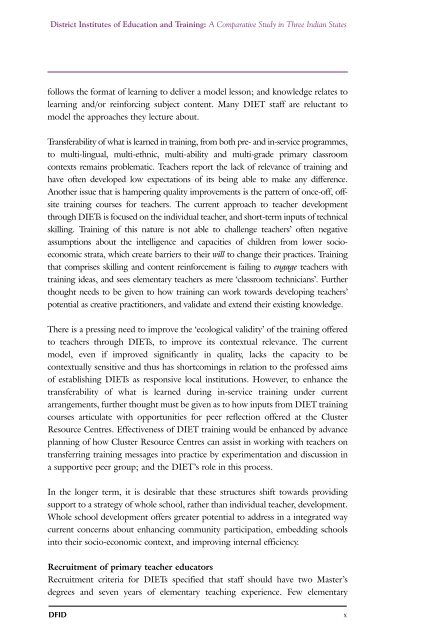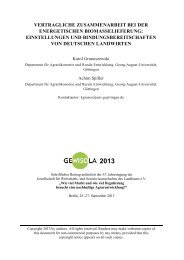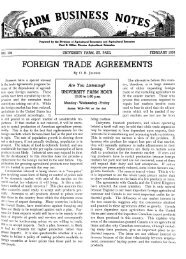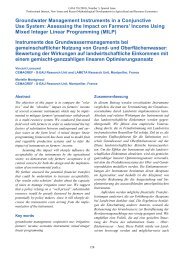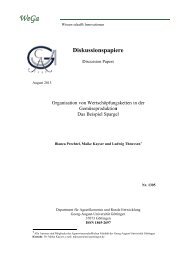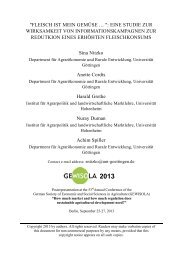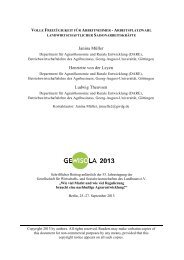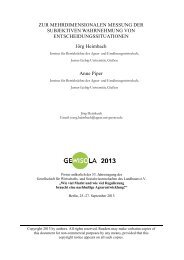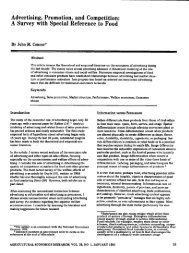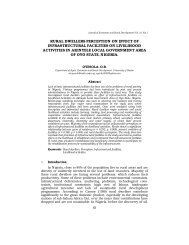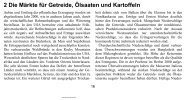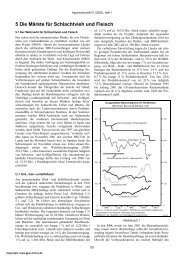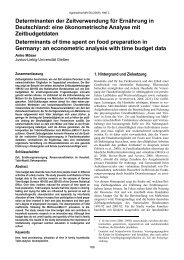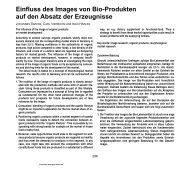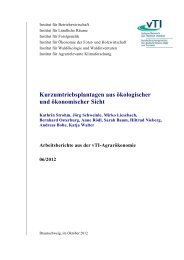District Institutes of Education and Training - Teacher Education
District Institutes of Education and Training - Teacher Education
District Institutes of Education and Training - Teacher Education
Create successful ePaper yourself
Turn your PDF publications into a flip-book with our unique Google optimized e-Paper software.
<strong>District</strong> <strong>Institutes</strong> <strong>of</strong> <strong>Education</strong> <strong>and</strong> <strong>Training</strong>: A Comparative Study in Three Indian States<br />
follows the format <strong>of</strong> learning to deliver a model lesson; <strong>and</strong> knowledge relates to<br />
learning <strong>and</strong>/or reinforcing subject content. Many DIET staff are reluctant to<br />
model the approaches they lecture about.<br />
Transferability <strong>of</strong> what is learned in training, from both pre- <strong>and</strong> in-service programmes,<br />
to multi-lingual, multi-ethnic, multi-ability <strong>and</strong> multi-grade primary classroom<br />
contexts remains problematic. <strong>Teacher</strong>s report the lack <strong>of</strong> relevance <strong>of</strong> training <strong>and</strong><br />
have <strong>of</strong>ten developed low expectations <strong>of</strong> its being able to make any difference.<br />
Another issue that is hampering quality improvements is the pattern <strong>of</strong> once-<strong>of</strong>f, <strong>of</strong>fsite<br />
training courses for teachers. The current approach to teacher development<br />
through DIETs is focused on the individual teacher, <strong>and</strong> short-term inputs <strong>of</strong> technical<br />
skilling. <strong>Training</strong> <strong>of</strong> this nature is not able to challenge teachers’ <strong>of</strong>ten negative<br />
assumptions about the intelligence <strong>and</strong> capacities <strong>of</strong> children from lower socioeconomic<br />
strata, which create barriers to their will to change their practices. <strong>Training</strong><br />
that comprises skilling <strong>and</strong> content reinforcement is failing to engage teachers with<br />
training ideas, <strong>and</strong> sees elementary teachers as mere ‘classroom technicians’. Further<br />
thought needs to be given to how training can work towards developing teachers’<br />
potential as creative practitioners, <strong>and</strong> validate <strong>and</strong> extend their existing knowledge.<br />
There is a pressing need to improve the ‘ecological validity’ <strong>of</strong> the training <strong>of</strong>fered<br />
to teachers through DIETs, to improve its contextual relevance. The current<br />
model, even if improved significantly in quality, lacks the capacity to be<br />
contextually sensitive <strong>and</strong> thus has shortcomings in relation to the pr<strong>of</strong>essed aims<br />
<strong>of</strong> establishing DIETs as responsive local institutions. However, to enhance the<br />
transferability <strong>of</strong> what is learned during in-service training under current<br />
arrangements, further thought must be given as to how inputs from DIET training<br />
courses articulate with opportunities for peer reflection <strong>of</strong>fered at the Cluster<br />
Resource Centres. Effectiveness <strong>of</strong> DIET training would be enhanced by advance<br />
planning <strong>of</strong> how Cluster Resource Centres can assist in working with teachers on<br />
transferring training messages into practice by experimentation <strong>and</strong> discussion in<br />
a supportive peer group; <strong>and</strong> the DIET’s role in this process.<br />
In the longer term, it is desirable that these structures shift towards providing<br />
support to a strategy <strong>of</strong> whole school, rather than individual teacher, development.<br />
Whole school development <strong>of</strong>fers greater potential to address in a integrated way<br />
current concerns about enhancing community participation, embedding schools<br />
into their socio-economic context, <strong>and</strong> improving internal efficiency.<br />
Recruitment <strong>of</strong> primary teacher educators<br />
Recruitment criteria for DIETs specified that staff should have two Master’s<br />
degrees <strong>and</strong> seven years <strong>of</strong> elementary teaching experience. Few elementary<br />
DFID x


